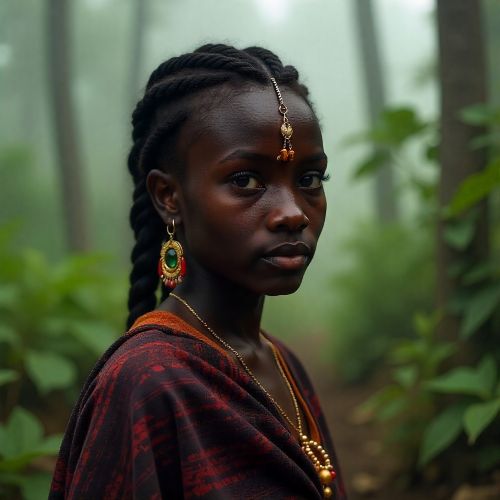Nzebi Mythology
Nzebi mythology, originating from the Nzebi people of Gabon and the Republic of the Congo, represents one of the most spiritually intricate and symbolically rich traditions of West-Central Africa. Deeply connected to nature, ancestral reverence, and moral order, Nzebi mythology reflects a worldview in which the seen and unseen worlds are inseparably intertwined. The Nzebi believe that all life is animated by divine energy—a vital force that flows through rivers, forests, animals, and human beings alike. Their mythology offers profound insights into creation, morality, and the sacred relationship between humanity and the cosmos, blending ancient African cosmology with a deep ecological spirituality.
At the heart of Nzebi mythology lies the supreme creator god Nzambi, the source of all life and balance in the universe. Nzambi is a distant yet all-pervading being who created the world, set natural laws in motion, and entrusted its care to spirits and ancestors. While Nzambi represents cosmic order, the daily maintenance of harmony falls to numerous nature spirits and ancestral forces, collectively known as the Bakulu. These spirits inhabit sacred trees, rivers, caves, and stones, ensuring the fertility of the land and the wellbeing of the community. Ancestors are considered ever-present protectors—spiritual guides who mediate between the living and Nzambi. Their favor brings prosperity and healing; their neglect invites misfortune.
Nzebi cosmology also revolves around the concept of duality and balance. Life and death, joy and sorrow, order and chaos are not opposites but complementary aspects of a single divine reality. The Nzebi believe that the visible world is mirrored by an invisible spiritual realm where ancestors dwell, maintaining a circular relationship with the living. Death, therefore, is not an ending but a transition—an entry into the ancestral plane known as Mbumbi. From there, the ancestors continue to influence human affairs, guiding moral behavior and ensuring that the laws of harmony established by Nzambi remain unbroken.
Rituals, songs, and dance are central to Nzebi religious life, serving as both spiritual communication and moral education. Ceremonies are held to mark important life events—birth, initiation, marriage, and death—each infused with mythological meaning. Masks and sacred carvings play a vital role, embodying spirits and ancestors during communal rites. The Bwiti spiritual tradition, which originated among neighboring peoples but shares deep roots with Nzebi belief, reflects similar ideas of ancestral contact and cosmic enlightenment through ritual experience. For the Nzebi, myth is not mere storytelling—it is a living practice that sustains identity, community, and balance between the physical and spiritual worlds.
Nzebi mythology also carries profound ecological wisdom. Every tree cut, animal hunted, or river crossed is considered a spiritual act that must be approached with respect and intention. Offerings are made to thank the spirits before harvesting or hunting, ensuring the continued flow of divine blessing. This sacred reciprocity expresses the Nzebi conviction that human life is part of the world’s soul, not separate from it. Today, Nzebi mythology remains a living tradition—preserved in oral narratives, art, and ritual practice—reminding humanity that to honor creation is to honor the Creator.


